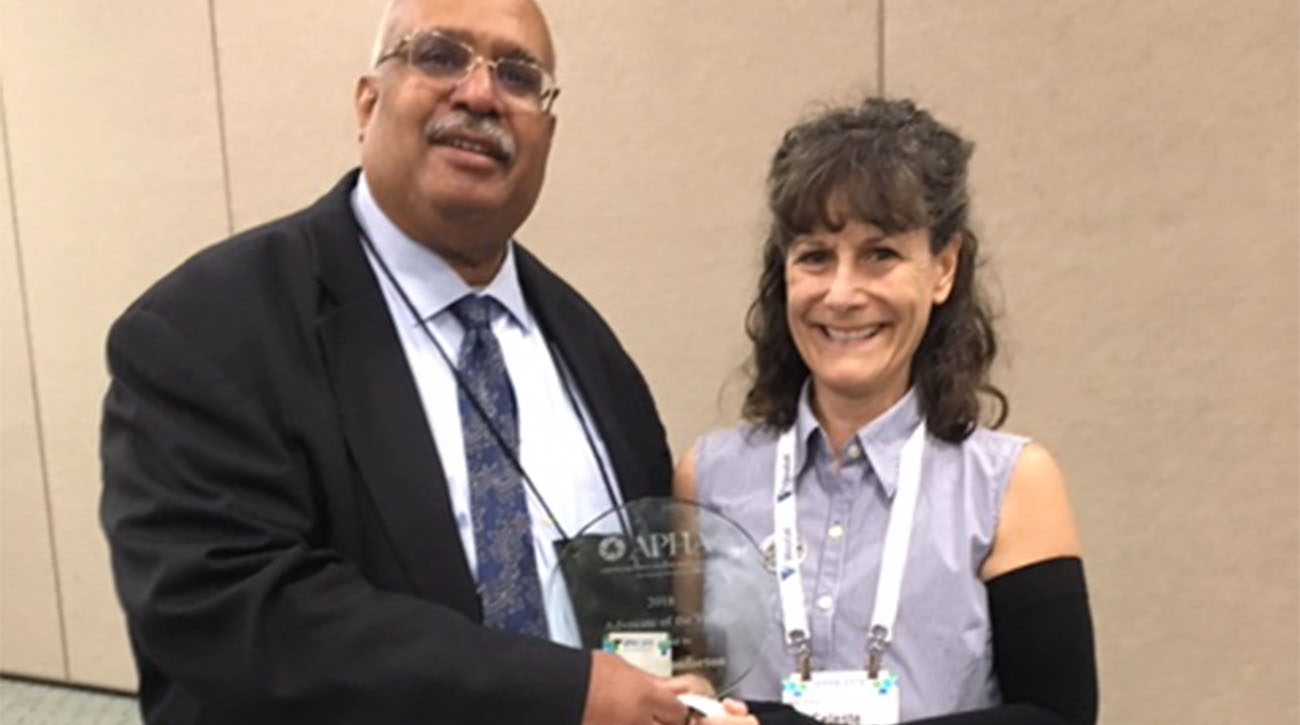The American Public Health Association (APHA) honored Celeste Monforton, DrPH, MPH as the organization’s Advocate of the Year at this year’s meeting held in San Diego. Monforton earned both her MPH and DrPH at the George Washington University Milken Institute School of Public Health’s Department of Environmental and Occupational Health (EOH), and she currently serves as a professorial lecturer for the department. As she says in her EOH biography, “protecting worker safety is not only a professional commitment… it is a personal passion.”
“Celeste is a dedicated and valued APHA member and it was such a pleasure to present her with this year’s APHA Advocate of the Year award,” says Georges C. Benjamin, MD, the APHA’s executive director. “Over the years, she has been a leader in assisting APHA in its efforts to advocate for strong occupational safety and health policies at the federal level. We greatly value her expertise and her commitment to APHA and to improving the public’s health.”
The efforts and achievements that led to Monforton’s APHA award include playing a key role in working with APHA staff to develop comments for APHA on a number of important regulatory issues, says Donald Hoppert, the society’s director of Government Relations. “These issues include efforts to protect workers from workplace injuries, efforts to protect workers and the public from exposure to asbestos and other dangerous toxic chemicals, and efforts to ensure proper reporting by business of workplace injuries and illness,” he says.
Monforton’s decision to study public health was inspired by her work at the U.S. Labor Department, where she was initially a legislative analyst at the Occupational Safety and Health Administration. From there, she moved to the Mine Safety and Health Administration, where she was policy advisor to the Assistant Secretary.
During her doctoral studies, David Michaels, PhD, MPH, who is internationally recognized for his efforts to protect and enhance occupational health, was Monforton’s advisor. Following the Sago Mine disaster of 2006, which killed 12 coal miners, she paused her doctoral research to assist the investigation launched by the West Virginia governor. In 2010, she was part of an independent investigation convened by the governor to examine the cause of the Upper Big Branch disaster that killed 29 coal miners.
Monforton was hired as an assistant research professor for EOH in 2006. During the time she was a full-time faculty member, she was a core member of the Department's Scientific Knowledge and Public Policy (SKAPP) project. She authored several studies published in APHA’s flagship publication, the American Journal of Public Health, including her dissertation and a case study on the impacts of diesel particulate matter on underground miners. She and Michaels coauthored a widely cited a paper on mercenary science and the manufacture of scientific uncertainty. She won praise for showing her students environmental and occupational health in action, taking them to visit a sewage treatment plant, to don protective firefighting gear at a firehouse, and to remove plastics and styrofoam from the Potomac River.
In addition to her continuing relationship with EOH as a professorial lecturer, Monforton is also a lecturer in public health at Texas State University. She is co-chair of APHA’s policy committee on occupational health and safety and serves on the association’s Action Board. Her achievements and honors include being elected to the prestigious Collegium Ramazzini.


